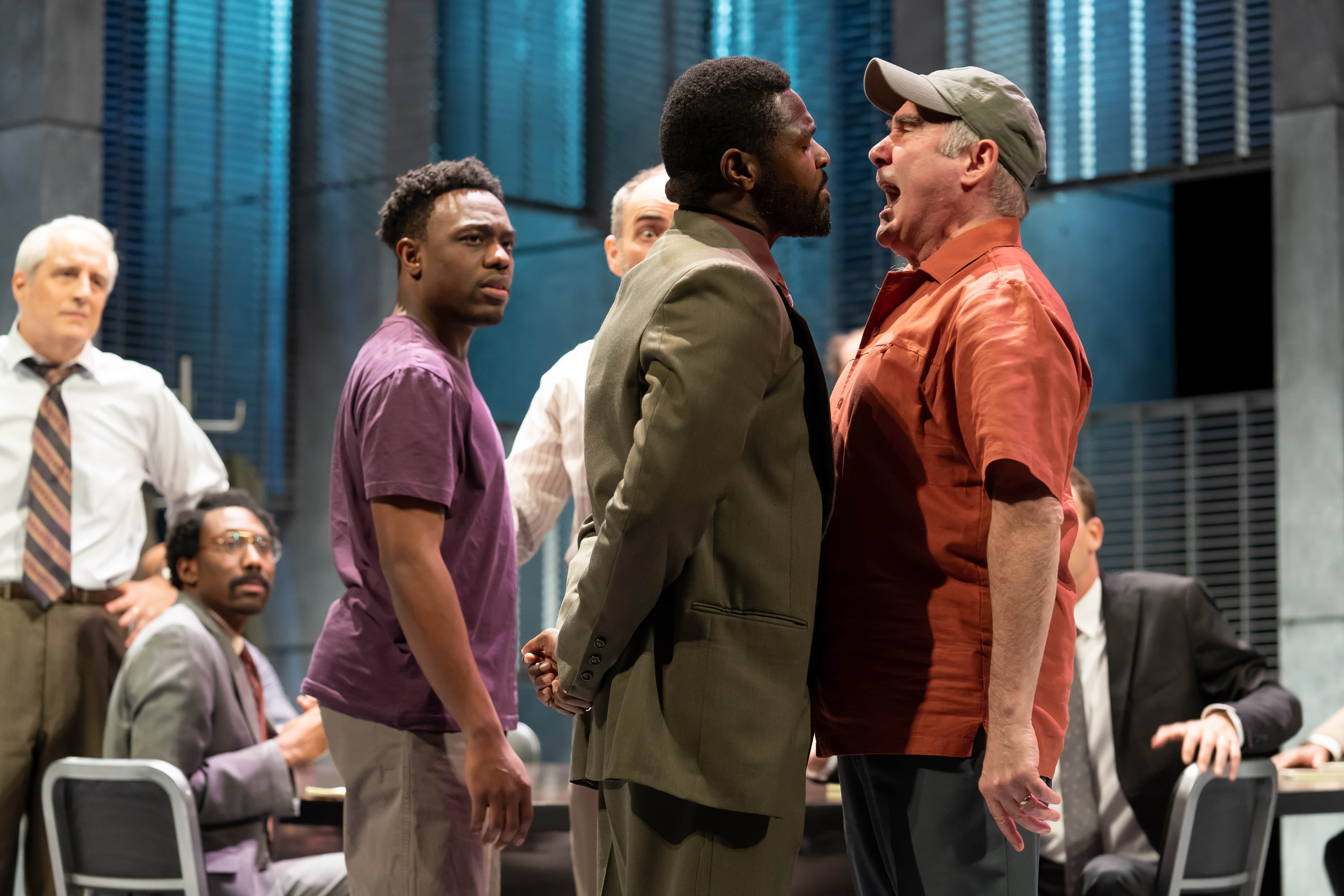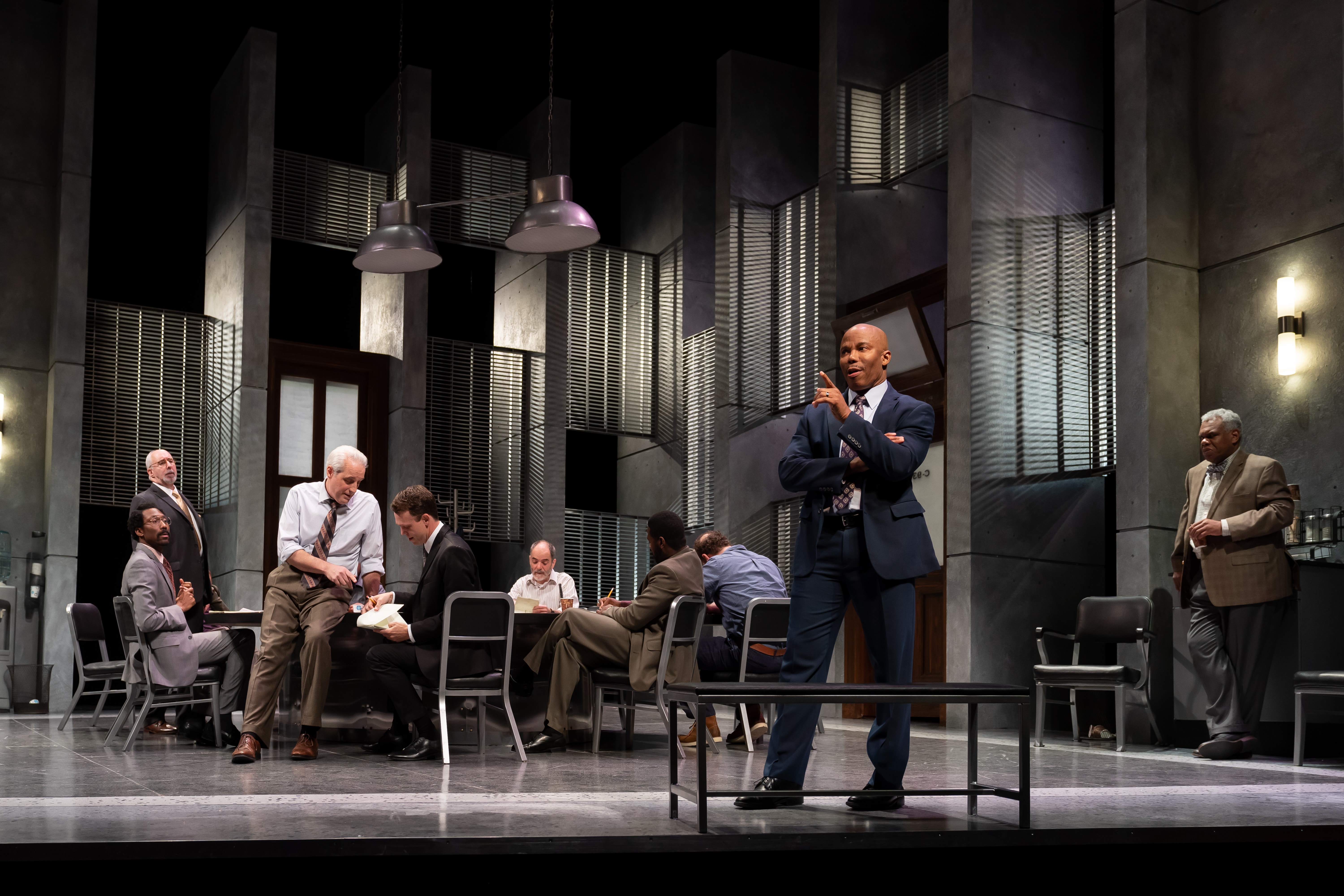Cross-racial casting can be totally wrongheaded—as when white actors impersonate characters of color. It can also be speciously universalizing—as when actors of color play all the parts in a work written as all-white. Rarely does cross-racial casting in itself lift a play to a new dimension of storytelling insight. But that’s exactly what Director Sheldon Epps has achieved with his staging of Reginald Rose’s 1954 Twelve Angry Men at Ford’s. Epps’s cross-racial casting conception offers a brilliantly original illumination for our times of an already riveting classic.
[Read David Siegel’s review of Twelve Angry Men.]
In Rose’s script, twelve white male jurors deliberate their verdict in the case of a 16-year-old boy accused of knifing his father to death. The boy’s ethnicity is unspecified—he is referred to as one of “them,” one of “those people”—not white like the jurors. Beginning from a straw vote of 11-to-1 in favor of guilty, the jurors argue and debate the evidence, steadily revealing their various degrees of bias up to and including this all-out racist rant:
You know what they’re like!… These people are born to lie…. They don’t know what the truth is. Well, take a look at them. They are different. They think different. They act different. Well, for instance they don’t need any big excuse to kill someone…. There is not one of them, not one who’s any good…. We’re facing a danger here…. These people are multiplying. This kid on trial, his type, they’re multiplying five times as fast as we are…. And they are—wild animals. They’re against us, they hate us, they want to destroy us….

Epps’s casting inspiration—which came to him in 2013 when he was artistic director of Pasadena Playhouse—was to have six of the jurors played by black actors and six played by white. He explains why in a recent interview:
I had a slot open up and become available shortly after Trayvon Martin was shot, which resulted in then president Barack Obama’s first speech addressing race and how alive racial issues were at the time. I felt strongly that I wanted to put something on the stage that addressed these sensitive and very explosive issues in a meaningful way. That led me to this casting concept of the play, which, without substantial changes to the dialogue, gives a new subtextual weight to the racial issues, which have always been inherent in the play. There were many discoveries in rehearsal that made the play even more immediate and visceral than we even anticipated.
At the invitation of Ford’s Theatre, Epps has brought his cross-racial conception to DC, and to watch it is to be enthralled by the subtextual depth and detail now apparent in the play.
In Rose’s script, the eleven jurors one by one change their vote to not guilty. In the Epps iteration, the first six to acquit are all black, beginning with Juror Eight (Erik King) followed by Juror Two (Sean-Maurice Lynch), Juror Five (Bru Ajueyitsi), Juror Six (Jason B. McIntosh), Juror Nine (Craig Wallace), and Juror Eleven (Bueka Uwemedimo).
The six who come around later are all white: Juror One (Eric Hissom), Juror Three (Michael Russotto), Juror Four (Christopher Bloch), Juror Seven (Lawrence Redmond), Juror Ten (Elan Zafir), and Juror Twelve (Brandon McCoy).
The dramatic moment when the jurors’ 6–6 split occurs along race lines has electrifying implications. Though not in the script, it speaks volumes. All the jurors of color, relating personally to the fate of the boy, have found reasonable doubt; all the white jurors are unbudging, still otherizing him. Immediately the resonance of the play amps up.
But even before that 6-6 split, and long before that MAGA-worthy tirade, there are nuances and subtleties in the cast’s performances that reveal realities about race relations with an eloquence beyond words. It is as if the black actors have written their own inner scripts with which to play their characters’ silent reactions to what the white characters are acting out loud.
Over and over, we see white characters assume that their reality is the only one. When a white character says something that racially stigmatizes the defendant, it reads as a microaggression to the black characters, who resist by deflecting or looking away as if to say “I’m not buying it” or by casting a “Do you believe this shit?” glance to another black character. And when a white character gets up in the face of a black character, invading his space, there’s a fleeting recoil at the presumption.
Often the blocking alone diagrams lines of social affinity and animus by race. White characters gather with other white characters, even as black characters drift to the periphery to avoid confrontation, looking to one another as if for connection. Tellingly at a point when a white character makes a joke, only other white characters find it funny. And who gives comfort to whom always has racial content.

By the time the unanimous verdict is reached, a shift has occurred in the racial dynamics among the characters. It’s very subtle, almost as imperceptible as the slowly darkening light when rain falls and evening comes. One by one the white characters break ranks with one another—unbonding from other men’s whiteness—and as they do we see a transformation in the black characters’ relationship to what was previously only a fraught social situation. By the end, a tentative cohesion emerges in the room. It’s partly because the twelve jurors have achieved a unanimity of verdict, of course. But in this production, it’s also because they have reached a transient equilibrium that though by no means raceless is for now not angrily raced.
In Twelve Angry Men, Sheldon Epps has staged one of the most salient racial recastings of a play I have ever seen. And in the interstices between the lines Rose wrote, an extraordinary cast of actors has uncovered and embodied a wealth of meanings unbeknownst to Rose.
Running Time: About two hours, with one intermission.
Twelve Angry Men plays through February 17, 2019, at Ford’s Theatre – 511 10th Street, NW, Washington, DC. For tickets, call the box office at (888) 616-0270, or purchase them online.




